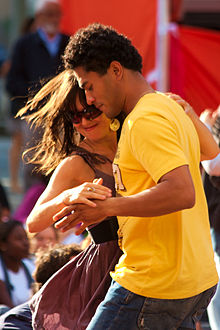
Back ميرينجو ARZ Merengue (baile) Spanish Merengue (tanssi) Finnish Меренге (танец) Russian Меренге Serbian Merengue (dans) Turkish
 | |
| Genre | Caribbean dance |
|---|---|
| Time signature | 4 4 |
| Origin | Dominican Republic |
Merengue (/məˈrɛŋɡeɪ/,[1] Spanish: [meˈɾeŋɡe]) is a style of Dominican music and dance. Merengue is the national dance of the Dominican Republic and is also important to national identity in the country. It is a type of danced walk and is accessible to a large variety of people with or without dance experience.[2] The music of merengue draws influence from European and Afro-Cuban styles and mainly uses instruments like guitars, drums, and a charrasca or metal scraper.[3] The dance originated as a rural dance and later became a ballroom dance.[3] Merengue has three distinct sections: the paseo, the merengue proper, and the closing jaleo which includes improvisation.[4]
Partners hold each other in a closed position. The leader holds the follower's waist with their right hand and the follower's right hand with their left hand at the follower's eye level. Partners bend their knees slightly left and right, thus making the hips move left and right. The hips of the leader and follower move in the same direction throughout the song. The rhythm of these steps often accentuates either the right or left step.[2] This pattern is often known as a ‘danced walk’. During this dance, a dancer will mostly put their weight on the same foot.[3] Partners may walk sideways or circle each other, in small steps. They can switch to an open position and do separate turns without letting go of each other's hands or by releasing one hand. During these turns, they may twist their handhold into intricate pretzels. Other choreographies are also possible.
Although the tempo of the music may be frenetic, the upper body is kept steady and turns are slow, typically four beats/steps per complete turn.
In the social dancing of the United States the "empalizada" style is replaced by exaggerated Cuban motion, taught in chain ballroom studios for dances of Latin American origin (cha-cha-cha, rumba, mambo, salsa).
- ^ William R Trumble, Angus Stevenson, ed. (2002). "merengue". Shorter Oxford English Dictionary. Vol. 1 (fifth ed.). Oxford: Oxford University Press. pp. 1750. ISBN 0-19-860575-7.
- ^ a b DANIEL, YVONNE (2011). Caribbean and Atlantic Diaspora Dance: Igniting Citizenship. University of Illinois Press. ISBN 978-0-252-03653-8. JSTOR 10.5406/j.ctt1xcfh4.
- ^ a b c "merengue | dance | Britannica". www.britannica.com. Retrieved 2022-04-01.
- ^ Cite error: The named reference
www.britannica.com-2was invoked but never defined (see the help page).